Key takeaways:
- Failure at film festivals is an opportunity for growth and learning, emphasizing the importance of resilience in the filmmaking process.
- Event context and audience connection significantly affect how films are received, suggesting that alignment with festival values is crucial.
- Engaging with fellow filmmakers can lead to collaboration and community building, despite initial self-doubt.
- Reflection on past failures can inspire creativity and new approaches in storytelling, enhancing overall artistic development.
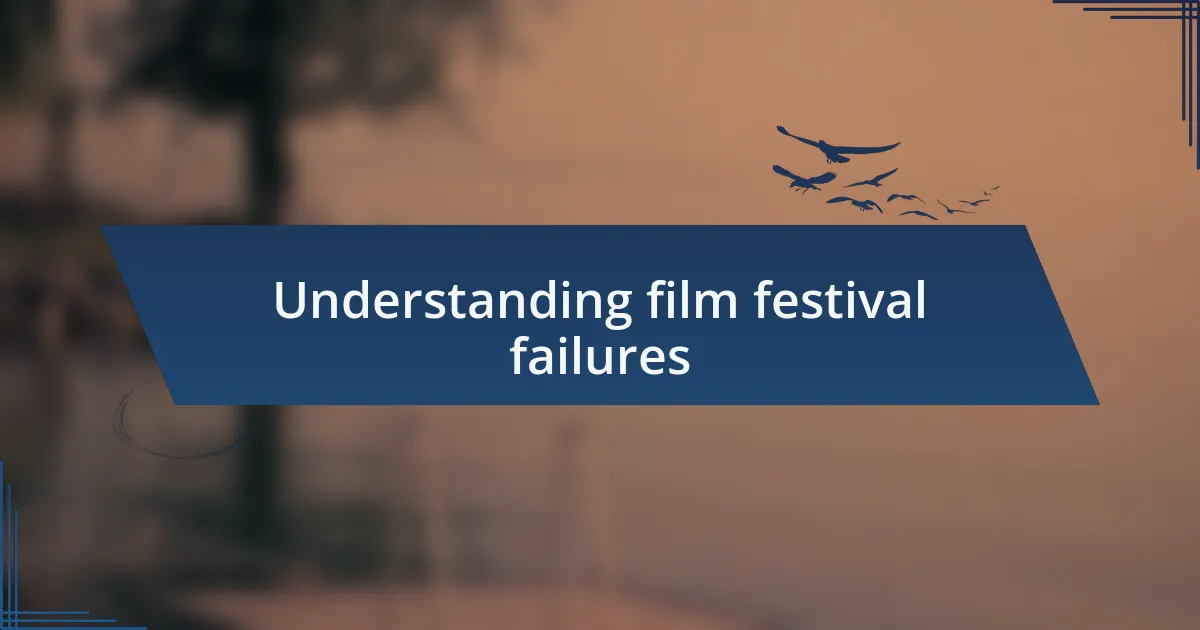
Understanding film festival failures
Navigating the landscape of film festivals can often feel like walking a tightrope. There was a time when I submitted a short film that I believed was my best work—only to face rejection without any feedback. It made me wonder, was the film truly that flawed, or was there something missing in how it resonated with the festival’s audience?
Failure at film festivals isn’t just about rejection; it’s about growth. I remember attending a screening where several films had technical issues, affecting the audience’s experience. It struck me then that even the most brilliant concepts can falter without proper execution. How do we learn from these moments? By embracing them as critical stepping stones rather than setbacks.
Often, the allure of prestige can overshadow the actual quality of the work. I’ve seen many filmmakers chase after high-status festivals, only to feel disheartened when their films didn’t shine. What if, instead of aiming for the biggest names, we focused on festivals that align with our values and vision? In doing so, we might find a more appreciative audience and meaningful connections in our artistic journeys.
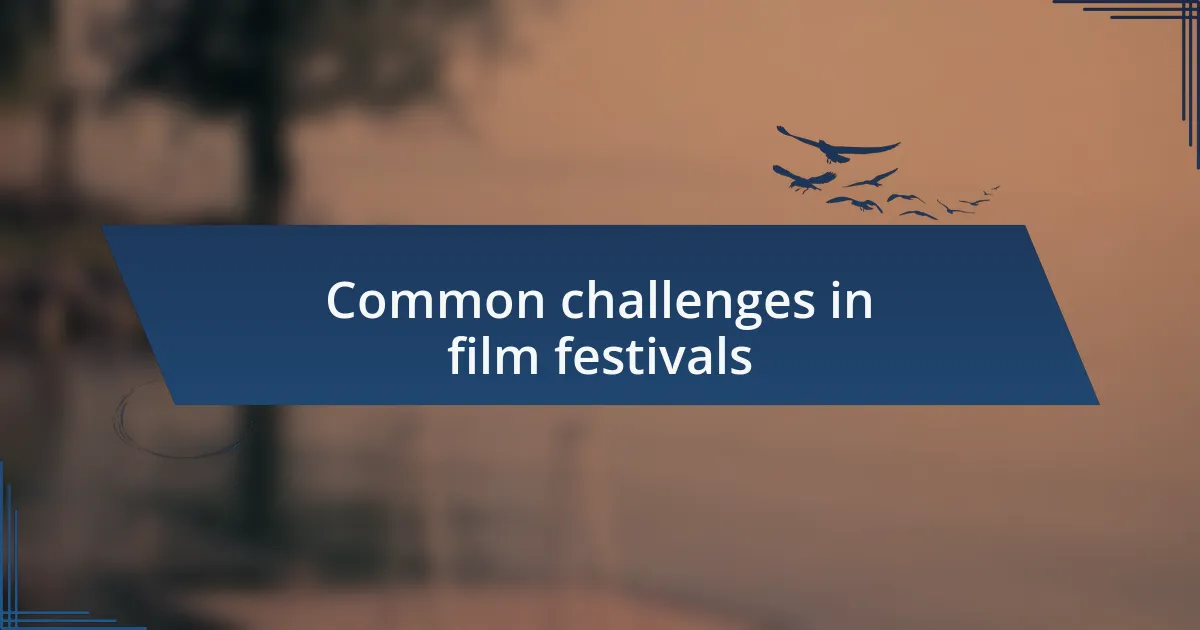
Common challenges in film festivals
Submitting films to festivals isn’t just about sharing your art; it’s often a test of resilience. I remember a time when I was excited about a submission but felt crushed when I discovered that the screening venue was a bit too unconventional for audience expectations. The challenge isn’t always about the film itself; sometimes, it’s the context in which it’s shown that can make or break its reception. Isn’t it interesting how the right platform can amplify a story, while the wrong one can obscure it entirely?
Competition can be incredibly daunting. I once attended a festival where my short was pitted against numerous high-budget productions. As I sat there, watching these stunning visuals play out, I felt my heart sink. I couldn’t help but wonder: Does a bigger budget always equate to better storytelling? In that moment, I realized it wasn’t just about the financial backing but the passion and authenticity behind each project that truly mattered.
Networking at festivals presents its own set of challenges too. Striking up conversations is often easier said than done, especially when self-doubt creeps in. I recall hovering near a group of seasoned filmmakers, feeling like an outsider. I asked myself, “What do they have that I don’t?” Over time, I learned that everyone, regardless of their status, hesitates before putting themselves out there. Engaging with fellow creators might just lead to unexpected collaborations and friendships, which can be invaluable. After all, isn’t that what these festivals are about—building a community?
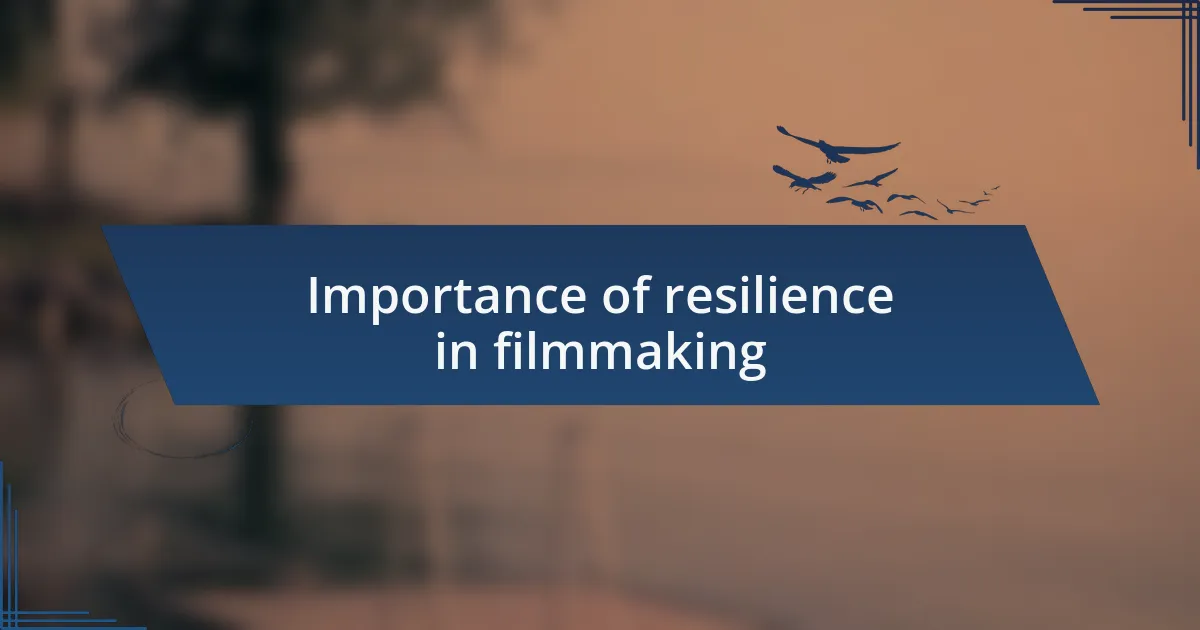
Importance of resilience in filmmaking
Resilience in filmmaking is crucial because the path is often riddled with setbacks. I remember a time when my script was met with outright rejection by a festival that I had pinned so much hope on. Instead of allowing that to deter me, I took it as a clear sign to refine my work and explore new narrative avenues. Wouldn’t you agree that sometimes setbacks can be the best teachers?
Moreover, the emotional rollercoaster of the festival circuit can be taxing. After my film was selected for a smaller festival, I expected an overwhelming sense of joy, but instead, I felt a wave of anxiety about meeting audience expectations. It’s during these moments of vulnerability that resilience shines. I learned to embrace the uncertainty, reminding myself that every screening, regardless of its outcome, is a step forward in my journey.
Ultimately, resilience fosters growth and creativity in the filmmaking process. I found that the more I faced challenges head-on, the more innovative my solutions became. It’s like building a muscle; each disappointment builds a stronger foundation for future projects. Isn’t it liberating to think that each failure can lead us closer to our artistic vision?
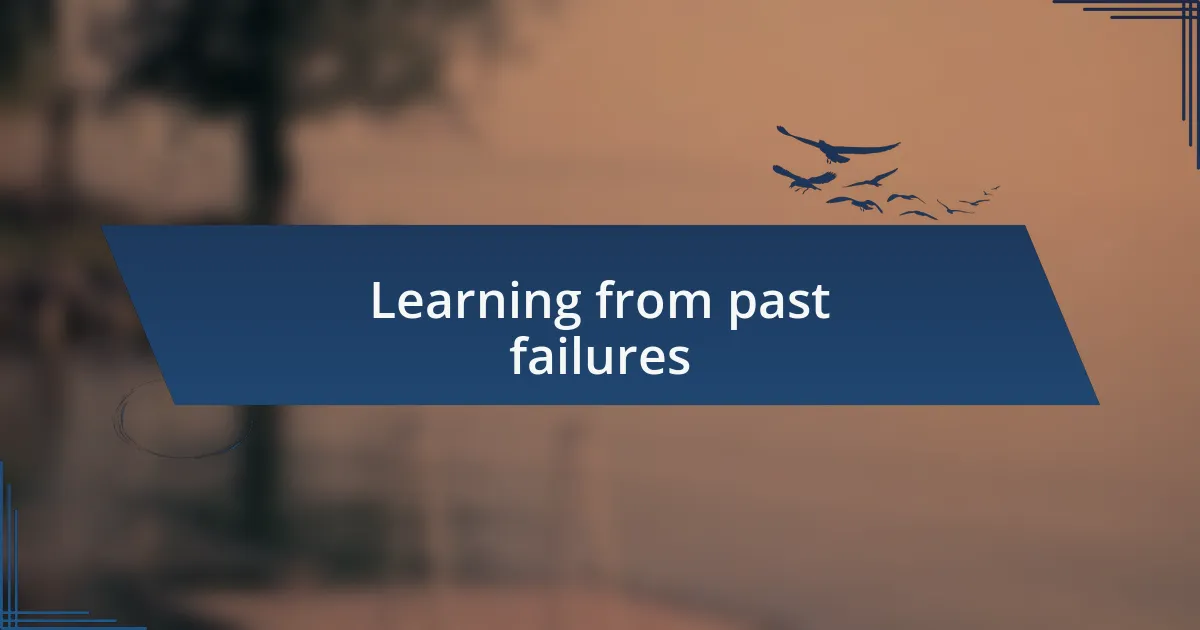
Learning from past failures
Sometimes, my failures have felt like an avalanche, overwhelming and crushing. I recall submitting a film that was deeply personal to me, only to see it screened in an empty theater. That silence was deafening. However, this experience forced me to reflect on the importance of audience connection. I realized that I needed to communicate my story more universally, which ultimately enriched my future projects. Have you ever had a moment where failure led you to discover something essential about your craft?
I remember the sting of losing a competitive grant that I had spent countless hours preparing for. It felt like my dream was slipping away. But instead of sulking, I chose to analyze the feedback I received. It was a game-changer. The insights I gathered helped me improve not just that project but my overall approach to storytelling. I learned that failure isn’t just a setback; it’s an opportunity for growth. Have you taken the time to dissect your failures to see what they can teach you?
I’ve often found that revisiting my past failures acts as a reminder of my personal evolution as a filmmaker. With each setback, I’ve realized the importance of keeping an open mind. For instance, after a particularly challenging experience, I found myself exploring genres I had never considered before. This exploration not only expanded my skill set but also rekindled my passion for storytelling. How has reflection on your past failures inspired new avenues in your artistic journey?
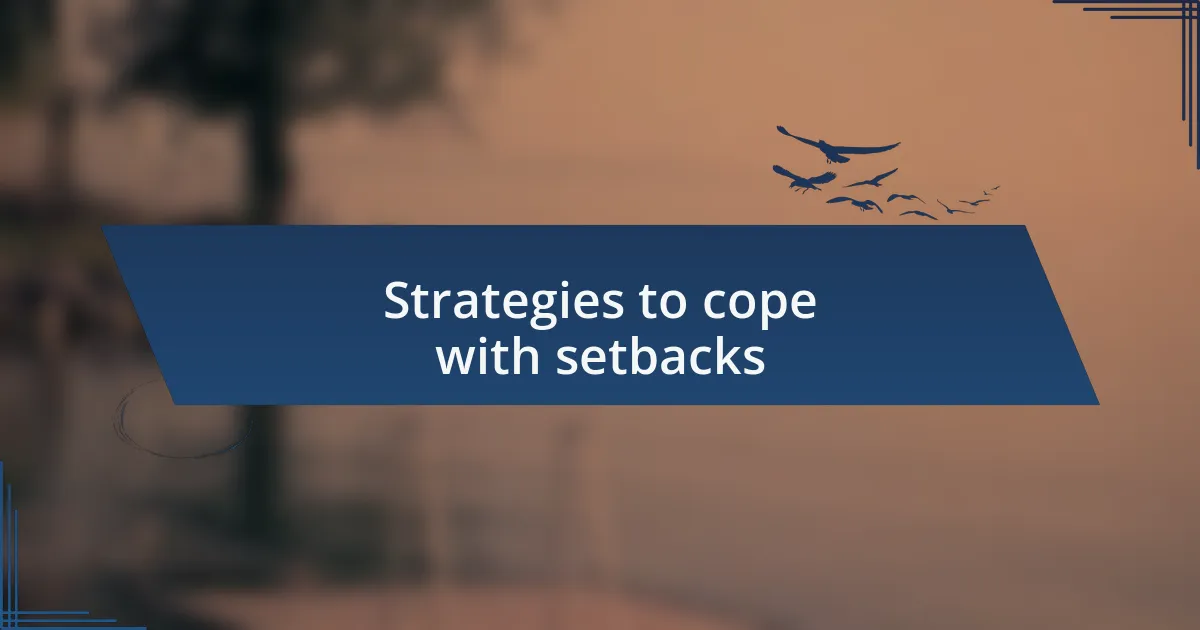
Strategies to cope with setbacks
One effective strategy I’ve embraced to cope with setbacks is developing a routine that includes self-care and reflection. After finding myself in a creative slump, I took time each week to journal my thoughts and feelings. This practice not only cleared my mind but also helped me identify patterns in my emotions related to failure. Have you ever found that simply acknowledging your feelings can be the first step toward overcoming them?
Another approach I’ve found valuable is seeking feedback from trusted peers. Early in my career, after a project didn’t resonate with audiences, I bravely reached out to fellow filmmakers for their opinions. Their constructive criticism was at times hard to hear, but it allowed me to view my work from different angles. This collaborative insight can be immensely helpful; who better to understand the hurdles of filmmaking than those who share the same journey?
I often remind myself that setbacks are an integral part of the creative process. During a film festival, one of my entries was met with mixed reviews. Instead of being disheartened, I embraced it as a chance to dive deeper into what my audience really wants. Have you considered using criticism as a compass, guiding your artistic decisions? This mindset shift has not only made me resilient but has also inspired a more authentic connection with my audience.
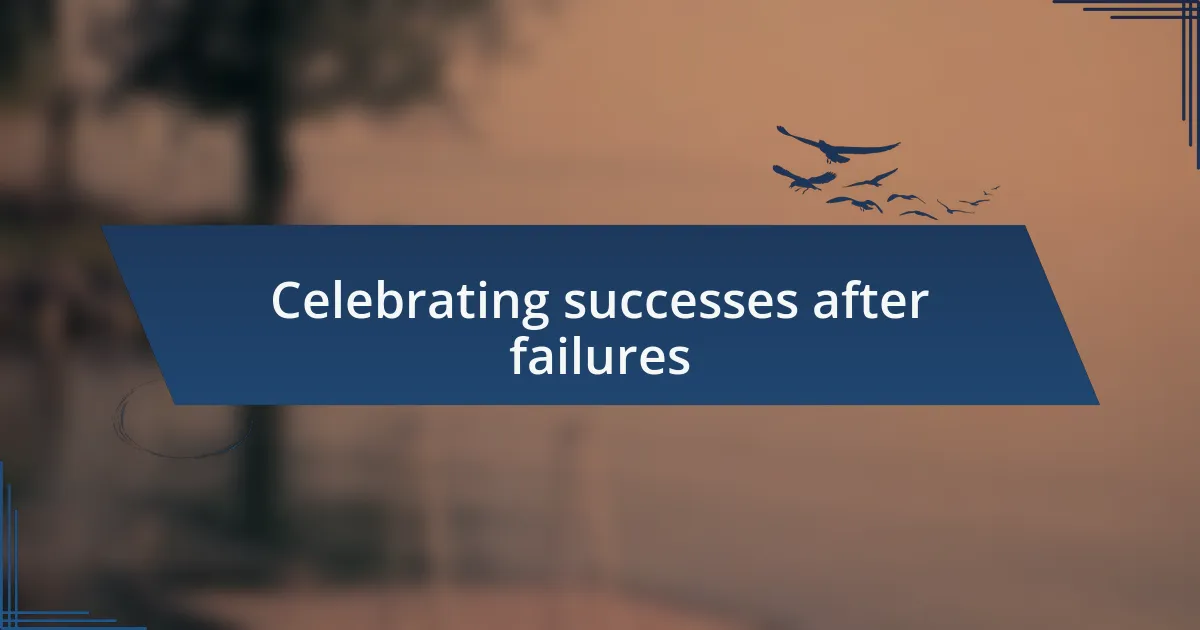
Celebrating successes after failures
Finding joy in the aftermath of failure is truly a remarkable experience. I remember screening my first short film at a festival where it didn’t garner the response I hoped for. Instead of wallowing in disappointment, I decided to host a little gathering with friends to discuss what went wrong and celebrate the courage it took to share my work. How many opportunities do we miss to celebrate our efforts simply because we’re focused on the outcome?
One pivotal moment for me was when I received an award for a project that, at first, felt like a colossal failure. I had poured my heart into it, only to be met with silence from audiences. However, that silence eventually led to deeper connections; I reworked the concept based on feedback and later turned it into a story that resonated. Celebrating that award wasn’t just about the applause; it was a testament to resilience and growth. Have you reflected on your own journey where a perceived failure later transformed into a defining success?
Each triumph feels more significant when rooted in the journey of overcoming failure. In one festival, I bumped into a fellow filmmaker who shared her struggles after her first feature flopped. As we discussed our experiences, we both agreed that those early missteps solidified our passion for the craft. Isn’t it fascinating how sharing these stories can foster a supportive community? I believe celebrating our small victories—whether it’s a completed script or just a well-attended screening—reminds us that each step, even the missteps, shapes our unique path in filmmaking.